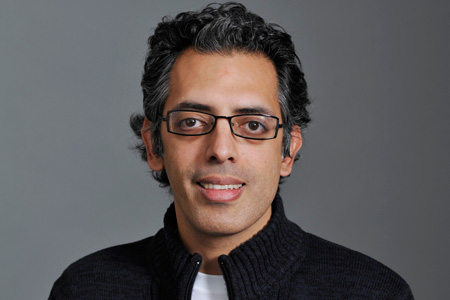Panel discusses Fanon’s relationship to modern issues
Three professors spoke about how the work of revolutionary thinker and writer Frantz Fanon relates to contemporary issues during a panel in Emerson’s Charles Beard Room on March 22. “Fanonian Geographies” was jointly sponsored by the Institute for Liberal Arts and Interdisciplinary Studies and Emerson Peace and Social Justice to commemorate the 50th anniversary of Fanon’s most famous work, The Wretched of the Earth.
Emerson Scholar-in-Residence Yasser Munif, University of Massachusetts professor Mickaella Perina, and University of Illinois at Urbana-Champaign professor Lou Turner each discussed Fanon in relation to their areas of expertise. Fanon expert and Emerson Honors Program Director Nigel Gibson moderated the discussion.

Munif related Fanon’s concepts of nationalism to the rebellion currently changing the face of Syria. Munif is from the capital of Syria, Damascus, and has been in contact with some of the rebels. He said that Syrians, in their uprising against the totalitarian Bashar al-Assad regime, are creating a form of nationalism that hasn’t been explored in the country since the 1920s. This form of nationalism is what Fanon refers to as new humanism: an awakening of the minds of the masses to establish national pride not based on official symbols, but on commonalities between people. “Flags and government buildings are ceasing to become the symbols of the nation,” Munif said.
The change is exciting for not only the Syrian people, but also the Arab world at large, Munif said. The uprisings in the Arab world, from Egypt to Bahrain, have let people break free from fear of the authoritarian and totalitarian regimes that rule most countries in that part of the world. “The politics of fear of the Arab regimes has been completely dismantled, and I think there is no way to go back to the dictatorships because people are not scared anymore,” he said.
Mickaella Perina looked at a different aspect of Fanon’s impact on modernity. She shares something in common with Fanon: They are both from the Caribbean island and French colony Martinique. Although the Antillean island was his homeland, Fanon turned his back on Martinique and moved to Algeria to participate in the Algerian war for independence.
“With Fanon’s move, Martiniquean problems remained unaddressed,” Perina said.
Because of his abandonment of the Martiniquean problem of colonialism, Perina explained, Fanon is “a difficult brother” for Antilleans. The French Caribbean is still a colonial system, and Fanon is an icon of national liberation. Therefore, Perina said, Martiniqueans are “really trying to get along with that difficult brother” in their work against colonialism.
Turner discussed a few of Fanon’s key concepts in relation to African identity and its connection with geography and colonialism. Fanon opens his book Black Skin, White Masks with a passage about how colonialism injected a serum of fear and trepidation into the colonized nation’s men and turned them into “natives,” a different species. Fanon’s goal was to counter the detrimental effects that colonialism, including the artificial grid Western countries imposed on the geography of Africa, had on national identity and consciousness in the country. His imperative was to forge an African unity.
Emerson offers three courses that focus on the topics of Fanon and post-colonialism: Key Contemporary Thinkers: Fanon, Post-Colonial Cultures, and Arab Uprisings: A Social History.
Categories